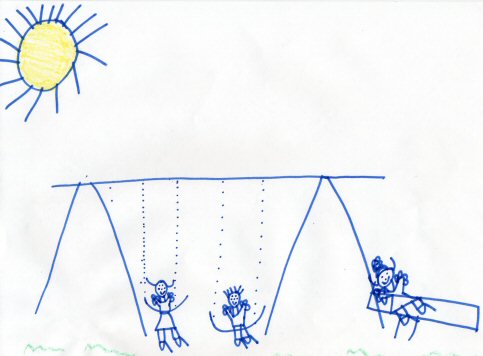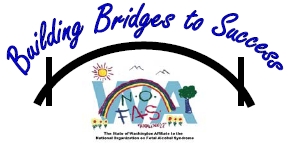

Newsletter
January 2006 |
||
|
||
A Great Voice of FASD RetiresAfter more than 30 years of tireless service to the field of Fetal Alcohol Spectrum Disorders (FASD), Dr. Ann Streissguth has officially announced her retirement as professor in the Department of Psychiatry and Behavioral Sciences, and director of the Fetal Alcohol and Drug Unit (FADU) within the University of Washington in Seattle. Ann founded the FADU in the early 1970’s, was involved in the initial study that identified the first cases of Fetal Alcohol Syndrome (FAS) in 1973, and began the first longitudinal study of the long term developmental effects of prenatal alcohol exposure. She was also one of the founding members of the Fetal Alcohol Syndrome Information Services (FASIS) board, which produces Iceberg.
Ann_received her Ph.D. from the University of Washington in 1964 and took a job as a psychologist in the departments of Psychiatry and Pediatrics. In 1973, Dr. David Smith, a dysmorphologist, asked her to see a series of children who were born to alcoholic women. These were the first children to be diagnosed with FAS. Thus was born her long interest in the effects of prenatal alcohol exposure. Since that time Ann has published over 124 articles, 62 book chapters, and 3 books on the subject. In a world of increasing difficulties with funding, Ann’s work has been continuously funded by grants from the federal and local governments and foundations since 1974. She has given talks on the effects of FAS to professionals and family members around the world. She is recognized as one of the leaders in this field and has trained many professionals who have gone on to do FASD research and clinical work. The Department of Psychiatry and Behavioral Sciences honored Ann’s many years of service to the university and the field of FASD by throwing a large party in November 2005. Many of her former colleagues and students were able to attend and see Ann again, some after many years of separation. Included among the speakers were Dr. Irwin Sarason, her dissertation chair, Dr. Richard Veith, the current chair of the Department of Psychiatry and Behavioral Sciences, Charles Huffine, an Iceberg board member and child psychiatrist, Jocie DeVries, from the FAS Family Resource Institute, Fred Bookstein, a statistician who has worked with Ann on her studies of FASD for nearly 20 years, and Therese Grant and other members of the Parent-Child Assistance Program. It was a wonderful evening to honor Ann’s service over the many years and to wish her good luck with her future endeavors. Despite Ann’s retirement, her brainchild – the Fetal Alcohol and Drug Unit – will continue to study the effects of prenatal alcohol exposure. Because no one person is able to fill Ann’s shoes, three individuals within the unit will take on directorship roles. Therese Grant has taken the position as director of FADU with the assistance of two co-directors; Fred Bookstein will serve as the scientific director and Paul Connor will serve as the clinical director.
And – lest you think that Ann has left the university for some well deserved rest and to pursue her other interests, including gardening and travel – I can happily inform you that immediately after her retirement, she was re-hired as professor emeritus within the university and continues to work part time at FADU writing research papers and running one of the studies she started over 30 years ago. Thank you, Ann, for being such a strong voice and advocate for families affected by prenatal alcohol damage! Karli’s artwork (completed in 2005)Although Karli Schrider lives with FASD and faces difficult daily challenges, she continues to motivate and inspire those who meet her. In 1994, Karli began volunteering for the National Organization on Fetal Alcohol Syndrome (NOFAS). NOFAS is a non-profit organization based in Washington, D.C., that is committed to raising public awareness of FASD.
Karli created artwork used by the organization on its prevention materials and in publications, and has helped disseminate FASD-prevention material. By allowing NOFAS to share her life story and experiences, Karli provides encouragement to others with FASD, and the families and educators who support them. Karli has appeared on numerous television programs such as “The
Leeza Show” and NBC’s “Real Life” to help
people understand the effects of FASD. Karli has also co-presented
at several national FASD conferences, and has been featured in many
FASD educational videos. In 1999, former President George Bush personally
presented Karli with the Daily Point of Lights Award for her volunteer
efforts. Karli’s efforts have been invaluable in the continuing
fight to increase the understanding—and ultimate prevention—of
Fetal Alcohol Syndrome. Karli is now 32 years old.
Save This DateTHE NATIONAL ORGANIZATION ON FETAL ALCOHOL SYNDROME WASHINGTON STATEINVITES YOU TO JOIN USThe 2006 Northwest Regional FASD Conference
(Washington, Alaska, Oregon, British Columbia) October 5 & 6, 2006. Conference Partners
National Organization on Fetal Alcohol Syndrome Alaska (NOFAS AK) National Organization on Fetal Alcohol Syndrome Oregon (NOFAS OR) National Organization on Fetal Alcohol Syndrome (NOFAS) Recognizing that diagnosis is only the first step on the continuum of care and intervention that individuals with Fetal Alcohol Spectrum Disorders require to be successful, we are offering a conference with a focus on bridging the gap between diagnosis and success. This regional conference will offer a mix of educational opportunities for individuals with alcohol related disabilities, parents, caregivers, nurses, educators, physicians, mental health workers, social workers, juvenile justice workers and other professionals working with and supporting individuals affected by prenatal alcohol exposure. Confirmed Speakers Invited Speakers For information contact: Julie Gelo, Executive Director, NOFAS WA (260) 940-2832, FASDSupport@aol.com Request for proposals documantation and submission form.
The Families Moving Forward Project: Promising Research Helps Families Raising Children with FASDSystematic research on intervention has long been needed to assist families raising children with Fetal Alcohol Spectrum Disorders (FASD). Families want to know what works. Professionals assisting families have also needed information about scientifically tested interventions that can help them be as effective as possible. Fortunately, over the past few years, the pace of such research has accelerated. Now there are a number of promising intervention models being studied. Research on a variety of models is important because FASD is a multifaceted problem, and we know that a continuum of intervention services is needed. Behavioral Consultation Services: An Essential Area of FASD Intervention ResearchBehavioral consultation services for caregivers are a very important and high-priority focus of FASD intervention research. Specialized behavioral consultation can provide flexible, ongoing and comprehensive support that is carefully targeted to the individual needs (and strengths!) of caregivers raising children with FASD who have especially challenging learning and behavior problems. Studying how best to offer behavioral consultation for FASD is essential. Behavioral consultation can be provided at a clinic, in the schools or, if at all possible, in a home-visiting model. Behavioral consultation provided as a home-visiting service can reduce many treatment barriers and generate practical intervention ideas based on a real understanding of the child at home and at school. Leading the way in study of behavioral consultation services is the Families Moving Forward (FMF) Project, a groundbreaking project funded by the Centers for Disease Control and Prevention (CDC) that began in 2001. The FMF model provides behavior consultation as a collaborative process between parents and a specially trained support specialist in every-other-week visits to the home. These home-based services make intervention accessible for families. The model includes targeted school consultation, when the support specialist can accompany the parent to the school to meet with the teacher (and sometimes other important school staff) at a time that is important for the child’s school progress. If additional school consultation is needed, this can be done—but behavioral consultation with the family is the most important aspect in FMF program. The parent is usually the child’s most important advocate across time. The “Families Moving Forward” Intervention ModelWhat actually happens in the Families Moving Forward Program? More information will be provided in the detailed scientific and clinical write-ups that the research team is at work upon right now. But a brief sketch of the intervention model in described below. Children clearly identified with FASD first receive neurodevelopmental testing, and their parents complete questionnaires and interviews. Home visits are then made over a 9 to 11 month period. In these visits, there is discussion covering a variety of topics to provide the parents support, specialized education, and practice on skills using a “family curriculum.” This curriculum includes fact sheets, work sheets, videotape and other specially designed materials to help parents feel more effective and hopeful, and to help them reshape their child’s behavior to be more adaptive (and less challenging) in everyday life. At its heart, the FMF intervention model is aimed at providing ongoing support to parents and helping them better understand their children. The intervention team also aims to help parents hone skills they already have while adding specialized parenting techniques to their care-giving repertoire. These specialized techniques are based on what we theorize (based on research and clinical experience) are best practices for raising children with FASD. The FMF model was built on the clinical wisdom of parents and clinicians who, for years, have cared for children with FASD. The intervention does not replace other community resources and providers that families find helpful, but adds value to these resources. With the help of their support specialist, families “move forward” on an improving life path. The FMF intervention is realistic—services are not expected to solve all problems; but interventionists join with families, hopefully helping to boost their progress in a positive direction and give them reason to be more optimistic. The FMF program is both “manualized” (has certain core components and a specific session flow) and “individualized” (has special optional components that different families can decide to do). The session flow starts with core components of the curriculum. About halfway through the home visits, a “pizza planning” session is held. This particular home visit is called a pizza planning session because the whole FMF program is described to caregivers as a pizza, with core components seen as the necessary pizza ingredients and optional components seen as “special” ingredients that a family can choose to include before their sessions are done. An example of a core component that all caregivers discuss and learn is “reframing,” in which caregivers come to see their child’s behavior in light of their neurodevelopmental disabilities. An example of an optional component that some families might choose is a session on calming strategies that can be used for children with FASD. Putting the Information to WorkThe FMF team finished intervention activities in 2004, and is now working hard on data analysis. Promising findings are beginning to emerge, and reports on the efficacy of the Families Moving Forward intervention model will soon be available. This project is another avenue by which the Washington State Fetal Alcohol Syndrome Diagnostic and Prevention Network (FAS DPN), based at the University of Washington in Seattle, aims to serve those with FASD in Washington state and beyond. Since the analysis of FMF data is still underway, findings reported here are preliminary, but several results are clear:
Here’s how information gained from the Families Moving Forward Project can be helpful to others interested in FASD intervention: • An intervention model designed for families raising children with FASD is available for further research:The FMF model of behavioral consultation services, specifically targeted to families raising children with FASD and challenging behavior problems, is now available for further testing. It is likely that this model and its treatment processes can be modified for use in clinic-based mental health settings and would translate easily to use in early intervention. Excitingly, more research on this intervention model is already underway! A new grant will transition services from their base in the University of Washington academic setting to a home-visiting community agency with multiple offices throughout Washington state. If research findings show the efficacy in the community setting that we expect, we hope that this agency will eventually provide services for families in need statewide (funded by sources such as Adoption Support or private insurance). The plan is also to train home-visiting agencies in other states to provide services according to the FMF intervention model. • Specialized training on treatment processes helpful for FASD can be made available.The FMF project has advanced our understanding of the specific treatment processes that may lead to improved outcome for families and children with FASD. These processes capture important parts of the collective clinical wisdom in FASD, combined with scientifically tested child treatment and parenting techniques. “Reframing,” discussed earlier, is one critical process, as is creating “accommodations,” – practical ways to modify a child’s environment and daily routine. “Brainstorming,” a third essential process, is a user-friendly set of positive behavior support techniques. And there’s more to the model! Work on the Families Moving Forward Program has provided the foundation for developing specialized training for professionals who want to be more effective in the field of FASD. This training can be useful to treatment providers such as mental health professionals and social workers, juvenile justice workers, educators, early interventionists and others.
For more information:Others interested in research and discussion about the Families Moving Forward model, or the ideas it has sparked, are invited to contact its director, Dr. Heather Carmichael Olson of the University of Washington, at a special email address: fassg@u.washington.edu. Please also see the related article in the April 2004 issue of Iceberg.
|
www.FASiceberg.org
iceberg_fas@yahoo.com
FASIS - Iceberg
P.O. Box 95597
Seattle, WA 698145-2597



